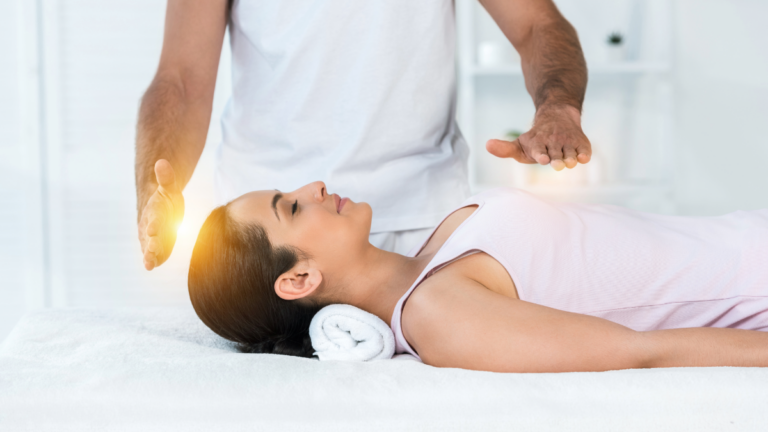Years ago, complementary therapies like acupuncture, mind-body practices, and herbal medicine were often dismissed by mainstream medicine as unscientific or even a little crazy. Critics argued that the lack of rigorous clinical trials and the reliance on anecdotal evidence made these practices unreliable at best, and potentially harmful at worst.
However, as scientific research has progressed, a growing body of evidence has emerged, demonstrating that these therapies can indeed offer real benefits for specific conditions. Today, these once-controversial treatments are increasingly integrated into conventional healthcare, thanks to their proven efficacy in areas such as chronic pain management and mental health support.
Acupuncture: Needlepoint Precision in Pain Relief

In a small clinic in New York City, a middle-aged woman lies on a treatment table, her back dotted with fine needles. She’s here for chronic back pain, a condition she’s struggled with for years. After trying countless medications and physical therapies, she turned to acupuncture as a last resort. Her experience is not unique; acupuncture has steadily gained acceptance as a valid treatment for chronic pain, backed by a growing number of studies that validate its effectiveness.
Research has shown that acupuncture can help modulate pain pathways and stimulate the release of endorphins, the body’s natural painkillers. A landmark study published in the Archives of Internal Medicine in 2012 analysed data from nearly 18,000 patients across 29 clinical trials and found that acupuncture was more effective than both no treatment and sham acupuncture (a placebo version of the therapy) for chronic pain conditions, including back pain, osteoarthritis, and migraines. The study concluded that the effects of acupuncture were more than just placebo, lending scientific credibility to the practice that has been used for thousands of years.
Yet, the debate is not entirely settled. Some researchers argue that the placebo effect cannot be completely ruled out, noting that patients’ belief in the treatment’s efficacy plays a significant role in their perception of pain relief. Despite these criticisms, the weight of evidence supports the notion that acupuncture offers tangible benefits, making it a valuable tool in the pain management arsenal. As Dr. Andrew Vickers, one of the lead authors of the 2012 study, noted, “While the placebo effect is real, the effect of acupuncture is above and beyond that, which is significant for clinical practice.”
Mind-Body Therapies: The Synergy of Mind and Movement

In a sunlit room, a group of individuals move gracefully through a series of yoga poses, their breaths synchronised with their movements. At the back of the room, a woman in her fifties closes her eyes and settles into a meditative state. She’s here to manage her anxiety, a condition that has plagued her for years. The practice of yoga, meditation, and tai chi has long been championed by advocates of mind-body therapies for its ability to reduce stress and promote mental clarity. Now, these practices are increasingly recommended by healthcare providers, bolstered by robust evidence of their effectiveness.
A comprehensive review published in JAMA Internal Medicine in 2014 found that meditation practices, including mindfulness meditation, significantly reduced symptoms of anxiety, depression, and chronic pain. The study, which reviewed 47 trials involving 3,515 participants, concluded that mindfulness meditation programs could improve these conditions with effects comparable to those of antidepressant medications. The review emphasised that these therapies offer a viable alternative or complement to traditional treatments, particularly for those seeking non-pharmaceutical options.
Similarly, yoga has been shown to improve not just mental health but also physical well-being. A study in the Annals of Internal Medicine in 2017 demonstrated that yoga was as effective as physical therapy for chronic low back pain, offering benefits in pain reduction, mobility, and overall quality of life. Tai chi, a gentle form of martial arts, has also been validated as an effective intervention for reducing stress and anxiety, as well as improving balance and overall fitness in older adults. These practices work by enhancing the body’s ability to regulate stress responses, fostering a sense of calm and resilience that can be transformative for those struggling with chronic conditions.
Herbal Medicine: Nature’s Pharmacy

In a bustling herbal shop in London, shelves are lined with jars of dried herbs and tinctures, each promising relief for various ailments. Among them, turmeric for inflammation, ginger for nausea, and St. John’s Wort for mild to moderate depression stand out as some of the most researched herbal remedies. Although herbal medicine has been used for centuries, it has often been met with scepticism in the modern medical community due to concerns about standardisation, dosage, and the potential for adverse interactions with conventional drugs.
However, research has begun to bridge the gap between tradition and science. For example, a 2018 meta-analysis published in the Journal of Clinical Psychopharmacology found that St. John’s Wort was as effective as standard antidepressants for treating mild to moderate depression, with fewer side effects. Similarly, a study in the Journal of Pain Research in 2017 highlighted the anti-inflammatory effects of turmeric (curcumin), showing that it could be as effective as ibuprofen for treating knee osteoarthritis, without the gastrointestinal side effects commonly associated with NSAIDs.
Despite these promising findings, the variability in product quality and dosing remains a significant challenge. Unlike pharmaceutical drugs, herbal supplements are not strictly regulated, leading to inconsistencies in potency and purity that can affect their efficacy. A study published in JAMA in 2013 found that many herbal products were contaminated or mislabeled, highlighting the need for stricter quality controls. As a result, experts recommend sourcing supplements from reputable manufacturers and consulting healthcare professionals before beginning any herbal regimen.
Growing Acceptance of Complementary Therapies
As complementary therapies gain traction in mainstream medicine, their evidence-based benefits are becoming harder to ignore. According to the National Center for Complementary and Integrative Health (NCCIH), nearly 40% of adults in the United States have used some form of complementary therapy in the past year, reflecting a growing demand for holistic approaches to health. In the UK, the popularity of complementary therapies is also on the rise, with the British Acupuncture Council reporting a 10% increase in acupuncture treatments over the past five years.
While past criticisms of these therapies centered on the lack of scientific validation, the growing body of rigorous research is helping to shift perceptions. Studies show that complementary therapies can offer effective, low-risk alternatives or adjuncts to conventional treatments, particularly for chronic conditions that are resistant to traditional medical approaches.
As the integration of these therapies into conventional healthcare continues, the focus is likely to remain on expanding the evidence base, improving quality control, and ensuring that these treatments are accessible, safe, and tailored to the individual needs of patients. This shift not only reflects a broader understanding of health and wellness but also a commitment to treating the whole person, mind, body, and spirit.

